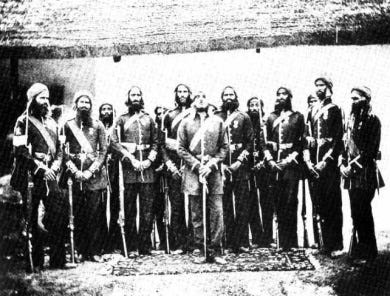BISHAN SINGH (d. 1868) was like his father, Sultan Singh, in the Ghorcharha regiment of Maharaja Ranjit Singh. In Maharaja Sher Singh`s time, he was placed in charge of the artillery park at Lahore. After the annexation of the Punjab by the British, Bishan Singh joined the 2nd Punjab Irregular Cavalry raised in 1849, and received the rank of Risaldar. During the uprising of 1857, he marched to Delhi with a squadron commanded by Sir Dighton Macnaghten Probyn and served his new masters with distinction.
CHARYARI SOWARS was the name given to an irregular cavalry regiment in Sikh times. It owed its origin to four friends, or Char (four) Your (friends), who were seen together all the time. Their names were: Bhup Singh Siddhu.Jit Singh, Ram Singh Saddozai and Hardas Singh Bania. They were all young men of the same age, very handsome, well built and always elegantly dressed. Maharaja Ranjit Singh became very fond of the foursome and employed them as soldiers. He was so impressed by their bearing that he gave them fine horses to ride and created a regiment named Charyari Sowars after them.
DEVA SINGH, SARDAR BAHADUR(d. 1872), son of Fateh Singh and a great grandson of Savan Singh, cousin of Sarigat Singh, the leader of the Nishanavali misi, came of a Shergil Jatt family of Mansurval, in Firozpur district. Deva Singh joined service under Maharaja Ranjit Singh in 1816 at a very young age. After some time, he was put under Lahina Singh Majithia who made him commandant of the regiment of his brother, Gujjar Singh. In 1834, he accompanied the young Sardar to Calcutta on a mission half complimentary, half political. In 1842, he was transferred to the Gurkha regiment to serve in Hazara.
FORD, MATTHEW WILLIAM (d. 1841), an Englishman who started his career in 1804 as an ensign in a West India regiment. He successively served with the 7th Foot, the 70th Foot, the 1st Royal Scots and the 22nd Light Dragoons. In 1823, he was appointed paymaster to the 16th Foot. While stationed at Karnal in 1837, he embezzled large sums of money and deserted the British troops. He came to Lahore towards the end of the year and joined the Sikh army as a battalion commander on Rs 800 per month, later commuted for jagir of three villages near Rawalpindi.
GORDON (d. 1837), often miscalled Canon, an Anglo Indian, entered the service of Maharaja Ranjit Singh in 1820 as an infantry instructor on a salary of Rs 500 per month. Later, he was put in command of a battalion of artillery. In July 1822, his battalion received approbation from Allard and Ventura and was ultimately incorporated in the FaujiKhas. Gordon was now charged with raising a new cavalry regiment to be called Akal Regiment.
- 1
- 2




